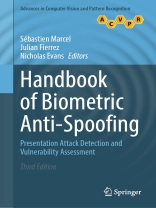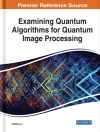The third edition of this authoritative and comprehensive handbook is the definitive work on the current state of the art of Biometric Presentation Attack Detection (PAD) – also known as Biometric Anti-Spoofing. Building on the success of the previous editions, this thoroughly updated third edition has been considerably revised to provide even greater coverage of PAD methods, spanning biometrics systems based on face, fingerprint, iris, voice, vein, and signature recognition. New material is also included on major PAD competitions, important databases for research, and on the impact of recent international legislation. Valuable insights are supplied by a selection of leading experts in the field, complete with results from reproducible research, supported by source code and further information available at an associated website.
Topics and features: reviews the latest developments in PAD for fingerprint biometrics, covering recent technologies like Vision Transformers, and reviewof competition series; examines methods for PAD in iris recognition systems, the use of pupil size measurement or multiple spectra for this purpose; discusses advancements in PAD methods for face recognition-based biometrics, such as recent progress on detection of 3D facial masks and the use of multiple spectra with Deep Neural Networks; presents an analysis of PAD for automatic speaker recognition (ASV), including a study of the generalization to unseen attacks; describes the results yielded by key competitions on fingerprint liveness detection, iris liveness detection, and face anti-spoofing; provides analyses of PAD in finger-vein recognition, in signature biometrics, and in mobile biometrics; includes coverage of international standards in PAD and legal aspects of image manipulations like morphing.This text/reference is essential reading for anyone involved in biometric identity verification, be they students, researchers, practitioners, engineers, or technology consultants. Those new to the field will also benefit from a number of introductory chapters, outlining the basics for the most important biometrics.
This text/reference is essential reading for anyone involved in biometric identity verification, be they students, researchers, practitioners, engineers, or technology consultants. Those new to the field will also benefit from a number of introductory chapters, outlining the basics for the most important biometrics.
İçerik tablosu
An Introduction to Fingerprint Presentation Attack Detection.- A Study of Hand-Crafted and Naturally-Learned Features for Fingerprint Presentation Attack Detection.- Optical Coherence Tomography for Fingerprint Presentation Attack Detection.- Interoperability among Capture Devices for Fingerprint Presentation Attacks Detection.- Review of Fingerprint Presentation Attack Detection Competitions.- Introduction to Iris Presentation Attack Detection.- Application of Dynamic Features of the Pupil for Iris Presentation Attack Detection.- Review of Iris Presentation Attack Detection Competitions.- Introduction to Face Presentation Attack Detection.- Recent Advances in Face Presentation Attack Detection.- Recent Progress on Face Anti-Spoofing against 3D Mask Attack.- Challenges of Face Presentation Attack Detection in Real Scenarios.- Remote Blood Pulse Analysis for Face Presentation Attack Detection.- Review of Face Presentation Attack Detection Competitions.- Introduction to Voice Presentation Attack Detection and Recent Advances.- A Cross-Database Study of Voice Presentation Attack Detection.- Voice Presentation Attack Detection Using Convolutional Neural Networks.- An Introduction to Vein Presentation Attacks and Detection.- Presentation Attacks in Signature Biometrics: Types and Introduction to Attack Detection.- Evaluation Methodologies for Biometric Presentation Attack Detection.- A Legal Perspective on the Relevance of Biometric Presentation Attack Detection (PAD) for Payment Services Under PSDII and the GDPR.- Standards for Biometric Presentation Attack Detection.
Yazar hakkında
Prof. Sébastien Marcel is a Senior Researcher and Head of the Biometrics Security and Privacy Group at the Idiap Research Institute, Martigny, Switzerland. He is a Lecturer at École polytechnique fédérale de Lausanne (EPFL) and Professor at the Université de Lausanne (UNIL). He is also the Director of the Swiss Center for Biometrics Research and Testing. He was Vice-President Conferences of the IEEE Biometrics Council, and the Project Coordinator of the EC-funded TABULA RASA (Trusted Biometrics under Spoofing Attacks) and BEAT (Biometrics Evaluation and Testing) projects.
Prof. Julian Fierrez is a full Professor in the School of Engineering (EPS) at the Autonomous University of Madrid (UAM), Spain. He is Vice-Chair of the IAPR Technical Committee on Biometrics (TC4), has participated in large EU projects focused on biometrics since 2003 (most notably BIOSEC, BIOSECURE, TABULA RASA, and BEAT), and has received a number of best paper awards and other prestigious research distinctions, including the IAPR Young Biometrics Investigator Award 2017.
Prof. Nicholas Evans is a Professor at EURECOM, Biot, France where he heads research in Audio Security and Privacy within the Digital Security Department. He participated in the EU BIOSECURE, TABULA RASA, OCTAVE and TRe SPAs S-ETN projects and is among the co-founders of the ASVspoof (2015-2021) and SASV (2022) initiatives and challenge series relating to spoofing-robust voice biometrics.












